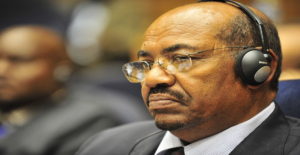Today marks the 7th anniversary of the International Criminal Court (ICC) issuing an arrest warrant for Sudanese President Omar al-Bashir for war crimes and crimes against humanity. In 2008, chief prosecutor of the ICC, Luis Moreno-Ocampo, brought the case against Bashir stating that there was evidence that the President implemented a strategic plan to destroy certain minority ethnic groups in Darfur. An arrest warrant was then issued for Bashir in 2009, making him the first sitting head of state ever indicted by the ICC. In 2010, a second arrest warrant accused Bashir of three counts of genocide. In response to the indictments, the Sudanese government banished a number of international aid agencies that were providing humanitarian relief to victims of violence in Darfur. In December 2014, the court’s prosecutor, Fatou Bensouda, formally suspended the investigation stating that the United Nations Security Council (UNSC) must do its part to enforce the arrest warrant. If Bashir is ever arrested, the investigation will reopen. March 4th
What is the ICC?
The International Criminal Court, instituted with the ratification of the Rome Statute, is a permanent, treaty-based court, developed to hold perpetrators accountable for the gravest international crimes: genocide, war crimes, and crimes against humanity. It operates as an independent, international organization based in The Hague.
The ICC is a court of last resort. That means that the ICC will not take a case if it is being legitimately investigated by a national or regional judicial system, unless such an investigation is being undertaken as a sham, solely to shield them from true justice.
A common misconception is that the Court has universal jurisdiction; it does not. The ICC is only able to prosecute crimes within a nation that is a party to the Rome Statute, the individual is a national of a state that is a party to the Rome Statute, or if the UNSC referred the case to the court (as was the case with Sudan).
A Short History
During the 20th century, international conflicts and wars brought about some of the world’s most heinous crimes. After the end of the Cold War, tribunals including the International Criminal Tribunal for the former Yugoslavia, the International Criminal Tribunal for Rwanda, and the Special Court for Sierra Leone, were set up in order to hold perpetrators of large-scale crimes accountable. The tribunals brought attention to the issue of impunity, but held limited jurisdictions. The ICC was established as a way to rid the need for ad-hoc tribunals, and develop an autonomous, permanent criminal court with a broader reach—albeit only for countries party to the Rome Statute, or, which get referred to the ICC by the UNSC.
As of today, there are 123 countries that are a party to the ICC, not including the United States.
Why can’t the ICC just arrest Bashir?
The International Criminal Court does not have the resources to arrest Bashir—unlike domestic courts which can call on a police force, the ICC does not have an international law enforcement agency that can bring perpetrators to stand trial. Instead, it relies on individual states and the UNSC to enforce its arrest warrants. Since the indictment, Bashir has traveled to several countries including Nigeria, Egypt, Kenya, Ethiopia and Chad—all which have failed to take any action to detain Bashir. China has also welcomed Bashir, despite being a member of the Permanent Five of the UNSC. In 2015, South Africa let Bashir fly home even after the country’s High Court instructed authorities to prevent him from leaving the country until they could determine whether or not to arrest the president. What is more, some of the world’s most influential nations—Russia and China, allies of Sudan, and the United States, supportive of the arrest warrant to some degree—have not joined the ICC. These countries’ unwillingness to submit to the authority of the ICC has undermined the ability to arrest Bashir.
What is happening in Sudan now?
The Sudanese people continue to suffer widespread and systematic attacks by the government. Khartoum claims it is fighting against the various rebel forces throughout Darfur, South Kordofan, and Blue Nile, however, their indiscriminate attacks and intentional denial of much-needed humanitarian aid are clear violations of international human rights and humanitarian law.
Recent attacks by the government in the Jebel Marra region of Darfur are some of the latest incidents of ongoing violence. South Kordofan and Blue Nile states likewise continue to endure bombings and systematic assaults by the Government of Sudan.
In order to hold Bashir accountable for his crimes, the international community and the UNSC must come together to bring Bashir to The Hague. You can keep track of any developments on Bashir’s arrest, and his travel here.


